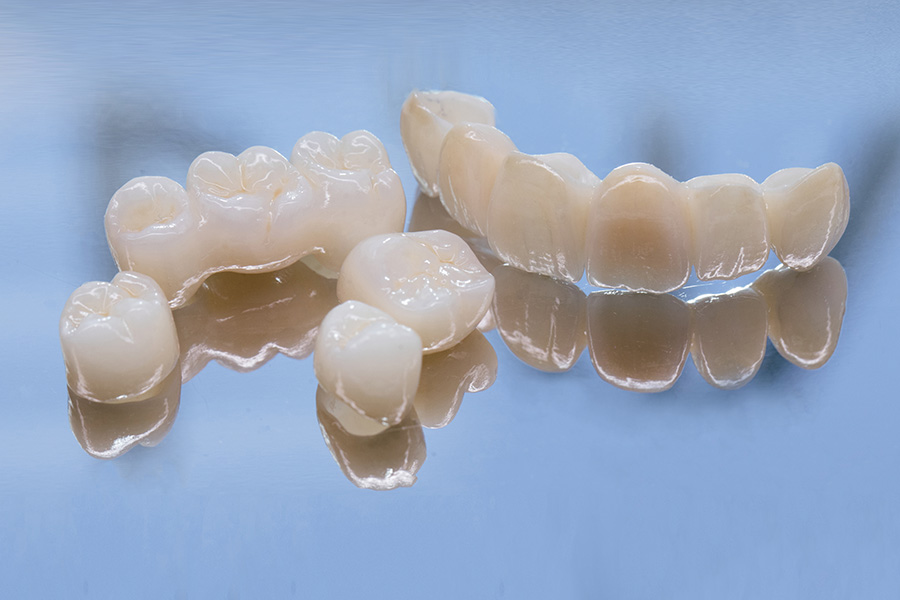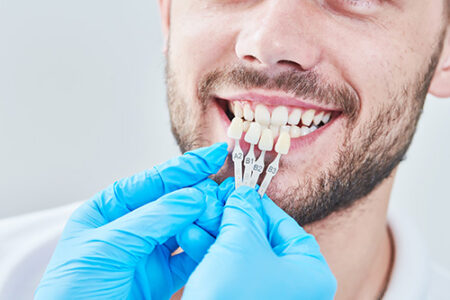How to Care for Your Porcelain Veneers, Crowns, and Bridges
Dental restorations are designed to look and feel like your natural teeth. To keep them looking good and functioning properly, taking proper care of them is essential!

Porcelain veneers, crowns, and bridges are long-lasting solutions to a variety of dental problems, including teeth that are:
- Missing
- Broken
- Chipped
- Cracked
- Decayed
- Misaligned
In the realm of cosmetic dentistry, porcelain veneers, crowns, and bridges provide a combination of artistry and science to transform smiles and restore dental function.
Caring for Your Porcelain Veneers
 Porcelain dental veneers are thin, custom-made shells that cover the front surface of teeth to correct several aesthetic concerns instantly.
Porcelain dental veneers are thin, custom-made shells that cover the front surface of teeth to correct several aesthetic concerns instantly.
They address issues like discoloration, structural damage, minor misalignments, and irregularities in shape or size to create a flawless, natural-looking smile.
While porcelain veneers provide such impressive results, caring for them is not difficult:
- Adopt a gentle oral hygiene routine: Brush your teeth at least twice daily with a soft-bristle toothbrush and non-abrasive toothpaste to avoid scratching the veneer’s surface.
- Attend your regular dental check-ups: Professional cleanings and check-ups are crucial for maintaining optimal oral health and monitoring the condition of your veneers.
- Maintain their integrity: You should never abuse your teeth, and when veneers have been placed, you want to take care not to damage them by chewing on non-food items like ice or using them as tools.
Caring for Your Porcelain Dental Crowns
Dental crowns cover and protect damaged or weakened teeth to restore strength, function, and aesthetics. Porcelain crowns are fabricated and color-matched to replicate the appearance of your natural teeth.
Keep them working for you by following these tips:
- Consider using a Waterpik®: In addition to brushing twice per day and flossing once, try using a water flosser like Waterpik® to reach between the gums and edges of your crown(s).
- Avoid excessive force: Refrain from using your crowned teeth to bite down on hard objects, as this can lead to chipping or cracking.
- Attend your regular dental check-ups: Routine check-ups help identify and address any issues with your crown(s) quickly to ensure long-term durability.
Caring for Your Porcelain Dental Bridges
Dental bridges replace one or more missing teeth and are anchored by crowns on adjacent natural teeth or dental implants. These dental prosthetics restore proper chewing function and prevent potential issues like the shifting of neighboring teeth.
To maintain your dental bridge’s longevity and avoid having to replace them prematurely:
- Use a Waterpik®: While a device like the Waterpik® is helpful but optional with crowns, they are unmatched in tier ability to maintain gum health and the stability of your dental bridge. Dental floss cannot clean between these replacement teeth because they are connected. As with crowns, water flossers also help clean the area between the gums and edges of the bridge.
- Alternatives to the Waterpik®: To maintain gum health and prevent the decay of nearby teeth, you can also use special floss threaders or interdental brushes to clean underneath the bridge. However, this method is not as thorough as a water flosser.
- Receive regular professional cleanings: Professional cleanings are essential to prevent plaque buildup around the bridge and ensure the overall health of your teeth and gums.
Unified Care Practices for Veneers, Crowns, and Bridges
Dental Restoration Care Basics:
Do:
Brush, floss, and rinse regularly
Invest in a Waterpik® for crowns and bridges
Visit your dentist for regular cleanings
Don’t:
Smoke and limit alcohol consumption
Chew on ice or hard objects
Use your teeth as tools
- Consistent oral hygiene: Maintain a consistent oral hygiene routine by brushing at least twice a day and flossing daily to prevent plaque buildup on natural teeth and dental enhancements.
- Avoid harmful habits: Steer clear of habits like smoking, biting on ice, or using teeth as tools, which can compromise the appearance and integrity of veneers, crowns, and bridges.
Protective Measures
Protect your restorations by using the following techniques:
- Night guards: If you grind your teeth (bruxism), consider using a night guard to protect both natural teeth and dental enhancements from excessive force.
- Customized bite guards: For those who play contact sports, wearing a personalized mouthguard helps protect dental work from potential impact.
- Limit destructive foods: Reduce your consumption of sugary and acidic foods to prevent decay around the margins of dental restorations like crowns, veneers, and bridges.
- Eat a balanced and nutritious diet: A diet rich in calcium, phosphorus, and vitamin D supports overall oral health and promotes the longevity of veneers, crowns, and bridges.
- Immediate attention to concerns: Regularly inspect your dental restorations for any signs of damage, discoloration, or other changes in appearance.
- Seek dental care promptly: If you notice any concerns, seek immediate attention from your dentist to address issues before they escalate.
By embracing diligent oral health care practices, like a gentle oral hygiene routine, a commitment to regular professional care, protective measures, and a tooth-friendly diet, you can enjoy your dental restorations for many years to come.
Porcelain Veneers, Crowns, and Bridges in Chicago, IL
Dr. Vlad Fedin offers quality general and cosmetic dental services in Chicago, Illinois, and provides individualized maintenance plans to ensure your new smile’s ongoing health and beauty.
If you find yourself inhibiting speech, laughter, or other authentic responses because you are insecure about the appearance of your teeth, call Dr. Fedin at (312) 642-6631 for a smile that radiates confidence and vitality.